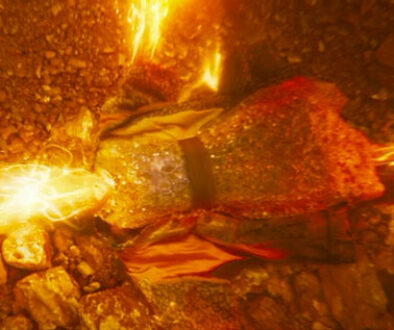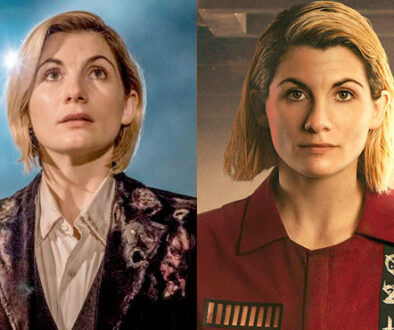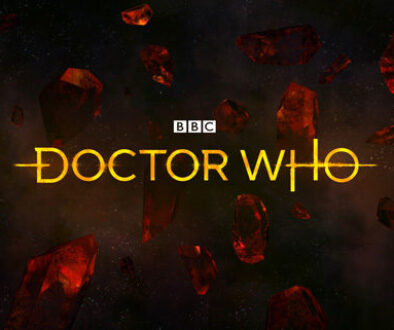“The Timeless Children” Review, Part 2 – So Many Questions
Clint Hassell continues his SPOILER-filled commentary on the tenth episode of Series 12.
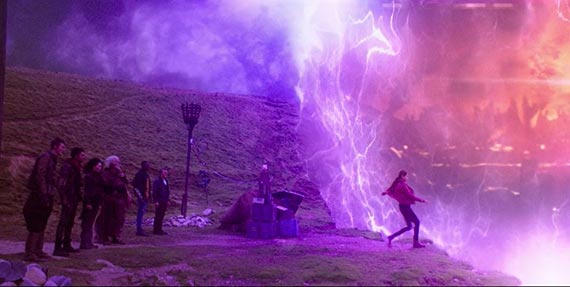
Note: this review contains full SPOILERS for episode 10 of Series 12.
How do you feel about the reveal that there are an untold number of pre-Hartnell iterations of the Doctor?
I’m ambivalent.
I think one of the best things Russell T. Davies did for Doctor Who was to remove Gallifrey and the mythology of the Time Lords from the forefront of the series, via the Time War. This focused the narrative on the Doctor and the companions, allowing newer viewers to appreciate the series regardless of their level of familiarity with the classic era. Both Davies and Steven Moffat were respectful of the previous continuity, often allowing aspects of it to flavor modern-era episodes, but they weren’t enslaved by it.
I’m not angered that Chibnall has canonized pre-Hartnell-era iterations of the Doctor, but – – aside from Jo Martin’s Doctor – – I am completely uninterested in meeting or learning more about any of those regenerations. I’m more invested in seeing the Doctor’s story move forward, not looking back at the series’ twisted continuity.
Still, there are some questions, just begging to be answered. . . .
Oh? Like?
If the Time Lords didn’t gain their regenerative abilities by being exposed to the energies of the Time Vortex, then how does one explain River Song?
If Ruth is a pre-Hartnell regeneration, then why is her TARDIS shaped like a phone box? The TARDIS’ chameleon circuit functioned until landing in 1963, with One and Susan, just before the events of The Unearthly Child.
How has the sonic screwdriver never registered that the Doctor isn’t Gallifreyan and only shares a fraction of her genetic makeup with others supposedly of her same race?
Why did the Doctor require a new set of regenerations, in “The Time of the Doctor,” and why did the Time Lords award them to Eleven?
If the Time Lords were created by combining Shobogan genetics with that of the Timeless Child, then why is “the Hybrid” a feared mythological figure, rather than a deified one, in Gallifreyan culture?
I’m sure there are ways to explain away each of these issues, but it seems like Chibnall is countering a lot of recent developments in order to canonize a one-off joke from a 43-year-old episode.
All fair points. However, you don’t actually expect casual viewers to care about this level of continuity, do you?
Oh, not at all! What I do think people will care about is how this reveal fundamentally changes the nature of the Doctor.
How so?
An immutable facet of the Doctor is that he chooses to help others, to fight for the oppressed and to save lives, when he can. Establishing that early versions of the Doctor were ordered by the Division to intervene “in other worlds and times” diminishes this character trait.
Further, One ran away from Gallifrey because he wanted to see more of the Universe than allowed by the Time Lords’ “strict non-intervention” policy. Is it any wonder why the Doctor habitually travels with companions who also have a strong desire to see more of the world than allowed by their familial or cultural expectations? The Doctor doesn’t just see the Universe through the eyes of his companions, he sees his story mirrored in them. The Division conscripting the Doctor into their service undermines this connection.
Oh, wow, that’s a shame. I’ve always loved those aspects of the Doctor.
Everyone does! And it’s particularly frustrating because these characteristics – – the wanderlust, the curiosity, the selfless desire to help others – – are imitable by Doctor Who’s audience. Positing that early versions of the Doctor were forced into their roles undermines the aspirational aspect of the character.
That really seems to run counter to the theme of “hope” running through Thirteen’s tenure.
It is, and I think Chibnall realizes that this revelation removes some of this hope from the character. Note that Graham points out that Yaz is more inspiring than the Doctor, because she mirrors the Doctor’s fearlessness and perseverance, but does so without a TARDIS or a sonic.
So, it’s the inherent changes to the Doctor’s character, and not the specific alterations to the show’s continuity, that caused you to not love “The Timeless Children”?
Oh, no – – my issues lie 100% with the terrible scriptwriting. It kills me, too, because I adore so much of Chibnall’s work on Torchwood – – but this episode contains toxic levels of exposition. In fact, “The Timeless Children” spends so much time explaining the Doctor’s new backstory that it is unable to answer more interesting questions raised by the narrative.
Oh! Like, why is Cyber technology suddenly compatible with the Time Lord’s bivascular anatomy? Or, how did the Master kill all of the Time Lords in such a way that they didn’t regenerate? And how were the resulting Cyber Masters once again able to regenerate?
No – –
I mean, yes. Those specific plot points are certainly problematic. There is so much handwavium in this script that the story suffers from heavy metal poisoning.
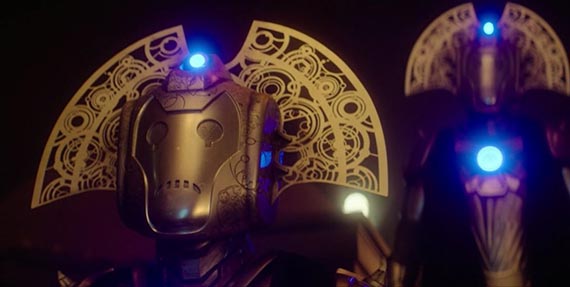
But what I mean is that there are larger, thought-provoking questions that the narrative doesn’t even seem to realize it has raised.
Gimme your list.
Tecteun is described as spending “several years” researching the Foundling’s regenerative ability. During this time, multiple regenerations are seen. Was the Timeless Child incredibly accident-prone? Or did Tecteun, in her obsession, “facilitate” some of these regenerations?
That’s dark!
Ruth was the catalyst for the Doctor’s escape from the Matrix, yet, this “summoned memory” seemed a part of the Matrix experience itself. Could it be that a somewhat sentient Matrix was rebelling against the Master, ensuring the destruction of the last vestiges of Gallifreyan knowledge before the renegade Time Lord could use it in his conquest of the Universe?
Despite desiring the weapon for his future plans, the Master leaves the Death Particle for the Doctor to find. Does he have a death wish? Or, is he legitimately happy to die, knowing that she also perishes? Is his plan to conquer the Universe actually his backup option?
How does Ko Sharmus have the resources to obtain the Cyberium and to send it back in time, but not to create better defenses against the Cybermen?
Or to see how survivors that have escaped through the Boundary are faring?
Or to remote detonate a bomb? (Sorry . . . too soon?)
You’re right – – there’s lots of fodder that went unmined in terms of story possibilities – – however, I did appreciate one nuanced point.
Do tell!
It was kinda silly that Tecteun was the inventor of space travel, a noted space explorer, and the geneticist responsible for engineering the Gallifreyan ability to regenerate, but she did rise to power within Time Lord society, as a result. That’s sensible for someone so accomplished, right?
Sure! She just had to become a man, first.
[blinks] Oh, look who’s sassy, tonight!
Someone was going to point it out.
You don’t think that was a purposeful decision, do you?
No, but it is a funny oversight, considering the great care to provide representation for every viewer, within the narrative.
Surely, seeing that the Timeless Child was multiple ethnicities, and both male and female, is a good thing, right? Now, every audience member can see themselves represented in at least one of the Doctor’s multiple forms!
Yes, representation is important. The idea that “you can’t be what you don’t see” in media is exactly why I don’t hide my sexual orientation or my mental health status in my professional life.
However, showing me a Doctor, who happens to be portrayed by a person of color, or by a woman, or by someone with a different body-type than myself, or who has a non-binary gender expression, etc., and getting me to realize why that Doctor is amazing and how their differences do not affect my enjoyment of their adventures does way more for representation than retconning the Doctor to have, at one point in the distant past, been non-white.

I am captivated by Jo Martin’s Doctor, and I love that we have such a capable, engaged actress of color in the role. Martin’s casting makes me proud to be a fan of this show. However, this only works if she continues to be prominent within the narrative. If Ruth’s entire tenure is confined to a bit role in two episodes – – if we never get to experience the full richness of her Doctor – – then Chibnall’s efforts toward inclusion is for naught.
Fair enough! What else do you want to talk about? How did you do on your Speculation BINGO predictions?
Out of the 25 guesses I made, 15 were correct (with, ostensibly, another two being true after the holiday special). Since both holograms and teleportation were used as narrative shortcuts; the Doctor gave a big, blustery speech; the TARDIS didn’t appear until episode’s end; Bescot died; and, technically, Graham ended the adventure with Ravio, we BINGOed!
That’s awesome! Was that your favorite aspect of the finale?
No! I mean, it was fun – – but, by far my favorite part was how, just days after I defended Yasmin as being the exceptional companion, the show made the same claim, via a tender scene with Graham:
Graham: “Listen, Yaz, um, if we don’t get out of this . . . I want you to know, I, I think you’re such an impressive young woman. Never thrown by anything, always fighting. . . . You said to the Doc that you thought she was the best person you’d ever met. Well, you know what, Yaz? I think you are. You ain’t got a time machine, or a sonic, but you’re never afraid, and you’re never beaten. You know, I’m gonna sound like a, like a proper old man, but you’re doing your family proud, Yaz, you really are. In fact, you’re doing the whole human race proud.”
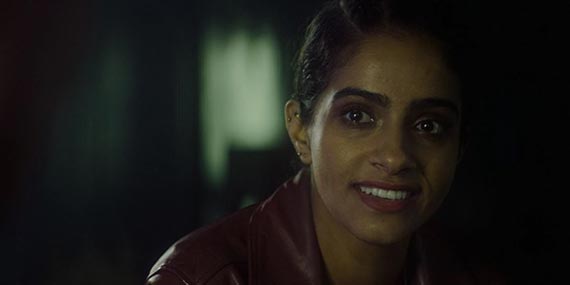
While I adore Mandip Gill, and I hope Yaz stays beyond “Revolution of the Daleks,” should the holiday special see Yasmin leave the TARDIS, I can part with the character knowing that her storyline received some closure. “The Timeless Children” demonstrated that she’s received the recognition she needed from her family, even if by proxy, from Graham, a part of her chosen “fam.”
Not only that, but later in the episode, when Graham asks, “Step into the unknown – – who fancies going first?” – –
– – the shot cuts to Yaz, who is already defiantly marching towards the Boundary! Oh, I fist-pumped the air.
Any other moments that had you cheering?
I gasped out loud at this:

That’s a TARDIS with a functioning chameleon circuit!
How does Chibnall remember it, here, but forget it in “Fugitive of the Judoon”?
Right?
I kinda love this quiet end to the companions’ storyline – – returned to Earth, all safe, with a two-bedroom TARDIS as a reminder of how they’ve grown. They finally learned the secrets of the Doctor . . .
Even traveling to Gallifrey!
. . . but barely get to say goodbye. The Doctor’s gone just as quickly as she appeared, in “The Woman Who Fell to Earth.” It’s a very classic-era end to a companion’s tenure.
Well, Graham, Ryan, and Yaz are listed as appearing in “Revolution of the Daleks,” so that may change.
I also love the tender moment of Thirteen appreciating the arboreal beauty of the TARDIS in which she escapes Gallifrey – – which also has a functioning chameleon circuit. “I can think of worse places to spend eternity,” she says, almost reverential of the sentient TARDIS she is abandoning.
Well, there’s always another TARDIS, if she needs it.
I am already writing the fanfic, in my head.
OK, so, final point?
Despite being positioned as a series finale, “The Timeless Children” seems more like the beginning of a longer storyline. And yet, rather than follow the Doctor on a quest of self-discovery, the upcoming holiday special will pay off the Judoon plot point from earlier in Series 12 and feature the Daleks. Again.
I am hopeful that Chibnall has a plan to mine Doctor Who’s newly revised continuity for its inherent storytelling possibilities. A running meta gag where the Master points out the flaw in Ashad’s plan to upgrade the Cybermen into fully mechanized warriors (“Oh, you mean ‘robots.’ You’ll be robots.”), demonstrates that Chibnall is acutely aware of his audience’s expectations. I’m just hoping that, in the end, the emphasis will be on the journey of discovery and not on the minutia of continuity that is unearthed.
Because, unfortunately, the inevitable side-effect of this mess is that, at some point, some executive is going to think there’s money to be made from a one-off, pre-Hartnell adventure, and they’re going to cast a “name” actor. Maybe the latest sex symbol who’s so hot, her lack of acting skills won’t be seen as a deterrent. A musician-turned-actor or a reality TV star. A “celebrity.” Maybe someone who is talented, but is inherently wrong for the part. Perhaps someone not familiar with the character, who will never be dedicated to the role’s legacy. Someone talked into it by their manager. Someone who will play the role and abandon it, immediately.
Kanye West as the Doctor. Justin Bieber as the Doctor. Jennifer Aniston as the Doctor. Arnold Schwarzenegger as the Doctor. Charlie Sheen as the Doctor.
Because it’s coming . . . and it’ll be all Chibnall’s fault.



